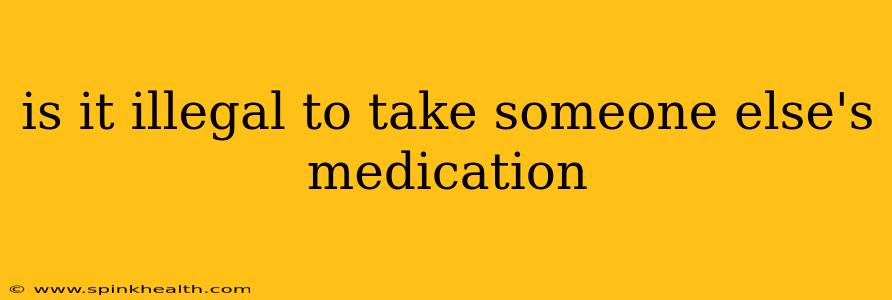Is It Illegal to Take Someone Else's Medication? A Look at the Legal and Ethical Ramifications
The short answer is: yes, it's illegal and incredibly dangerous to take someone else's medication. This seemingly straightforward question actually delves into a complex web of legal statutes and ethical considerations. Let's unpack it.
Imagine this: Sarah, feeling a nagging headache, sees her roommate, Mark, reaching for his prescription pain medication. Tempted to borrow a pill, she hesitates. Is it really that big a deal? The answer is a resounding yes. The ramifications extend far beyond a simple ethical breach.
Why is taking someone else's medication illegal?
Several laws govern the distribution and use of prescription drugs. The specifics vary by location (country, state/province), but the core principle remains consistent: prescription drugs are only legally dispensed to the individual for whom they were prescribed. Taking someone else's medication is a violation of these laws, often classified under drug possession or misuse statutes.
This is not just about paperwork. It is about public safety. Misusing prescription drugs can have serious consequences, including:
-
Adverse Drug Reactions: A medication effective for one person might be harmful to another, potentially causing allergic reactions, organ damage, or even death. Drug interactions between existing medications and the borrowed medication can further exacerbate the risks. A seemingly innocuous painkiller could be fatal for someone with a specific heart condition.
-
Dosage Miscalculation: Even if the medication is appropriate for the person taking it, the dosage might be wrong. Taking too much can cause overdose; taking too little might not provide the necessary relief, potentially masking a more serious underlying condition.
-
Drug Diversion: Taking someone else's medication contributes to the larger problem of drug diversion, the illegal distribution of controlled substances. This fuels the opioid crisis and other drug-related issues.
What are the potential legal consequences?
The penalties for taking someone else's medication can vary widely. They might range from a warning and counseling to fines, jail time, and a criminal record, depending on factors such as:
- The type of medication: Controlled substances (like opioids or benzodiazepines) carry far harsher penalties than over-the-counter medications.
- The quantity taken: Taking a single pill is likely to result in a less severe penalty than taking a significant amount.
- The jurisdiction: Laws differ from state to state, province to province, and country to country.
Is it ever okay to share medication?
Absolutely not. Under no circumstances should you share your medication, even with close family or friends. This is true even for seemingly harmless medications like over-the-counter pain relievers. What’s safe for one person may have adverse effects on another.
What if I'm experiencing a medical emergency?
If you have a medical emergency, seek immediate medical attention. Do not attempt to self-medicate using someone else's prescription. Emergency medical services will be able to provide appropriate care.
What should I do if I need medication?
If you are in need of medication, consult a doctor. They can properly diagnose your condition and prescribe appropriate medication at the correct dosage. Never try to obtain medication through unauthorized channels.
Can I legally dispose of someone else's medication?
While you shouldn't take someone else's medication, you might find yourself needing to dispose of it. In many locations, pharmacies or other designated drop-off points offer safe and legal ways to dispose of unwanted or expired medications. Check your local guidelines for proper disposal methods.
In conclusion, taking someone else's medication is illegal, unethical, and extremely dangerous. Always seek professional medical advice for your healthcare needs and follow all legal regulations concerning prescription drugs. Your health and the health of others depend on it.

